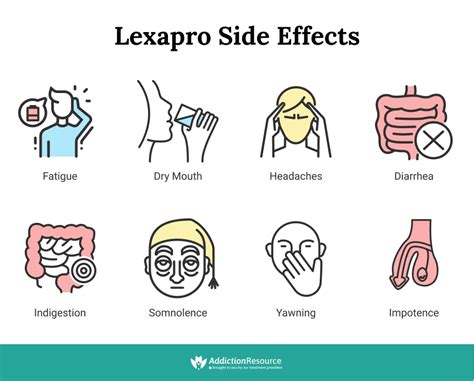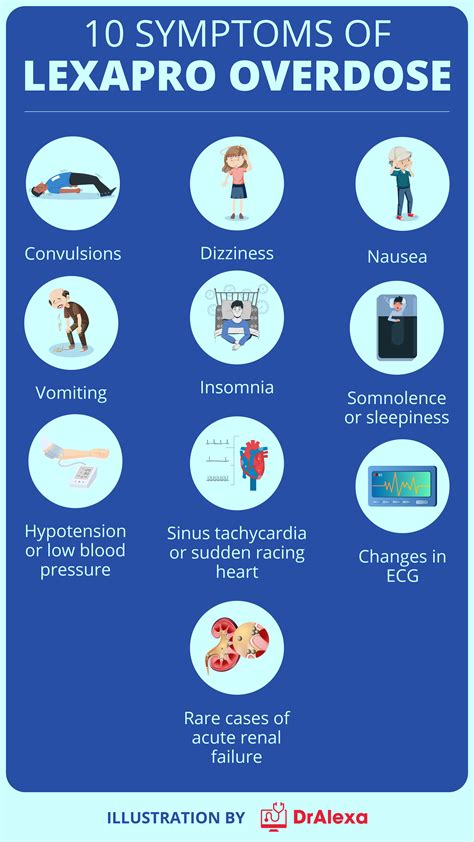Intro
Discover what Lexapro does, an antidepressant medication, and its effects on anxiety, depression, and mental health, using escitalopram to balance brain chemistry.
Lexapro, also known as escitalopram, is a type of antidepressant medication that belongs to the class of selective serotonin reuptake inhibitors (SSRIs). It is primarily used to treat depression and generalized anxiety disorder. The medication works by increasing the levels of serotonin in the brain, which helps to improve mood, reduce anxiety, and enhance overall mental well-being. By balancing the levels of neurotransmitters in the brain, Lexapro can help individuals manage their symptoms and improve their quality of life.
The importance of understanding how Lexapro works and its effects on the brain cannot be overstated. With the rising prevalence of mental health disorders, it is essential to have effective treatment options available. Lexapro has been shown to be a highly effective medication for treating depression and anxiety, with a relatively favorable side effect profile compared to other antidepressants. Furthermore, its mechanism of action is well understood, making it a popular choice among healthcare professionals.
As a society, we are becoming increasingly aware of the importance of mental health and the need for effective treatment options. Lexapro has been at the forefront of this movement, providing a safe and effective treatment for individuals struggling with depression and anxiety. By understanding how Lexapro works and its benefits, individuals can make informed decisions about their treatment options and take the first step towards managing their symptoms and improving their overall mental health.
How Lexapro Works

The exact mechanisms by which Lexapro exerts its effects are complex and not fully understood. However, it is believed that the medication works by increasing the levels of serotonin in the brain, which in turn activates various signaling pathways involved in mood regulation. Additionally, Lexapro may also have effects on other neurotransmitters, such as dopamine and norepinephrine, which can contribute to its therapeutic effects.
Benefits of Lexapro
The benefits of Lexapro are numerous and well-documented. Some of the most significant advantages of the medication include: * Improved mood: Lexapro can help individuals manage their symptoms of depression and improve their overall mood. * Reduced anxiety: The medication has been shown to be effective in reducing symptoms of anxiety and improving overall mental well-being. * Enhanced sleep: Lexapro can help individuals improve their sleep quality and duration. * Increased appetite: The medication can help individuals manage their appetite and weight. * Improved cognitive function: Lexapro may also have effects on cognitive function, including improved concentration and memory.Side Effects of Lexapro

It is essential to note that not all individuals will experience side effects, and the severity of side effects can vary widely. In some cases, side effects may be mild and temporary, while in other cases, they may be more severe and persistent.
Who Should Take Lexapro
Lexapro is indicated for the treatment of depression and generalized anxiety disorder in adults and adolescents. The medication may be prescribed for individuals who: * Have been diagnosed with depression or anxiety * Are experiencing symptoms of depression or anxiety, such as changes in mood, appetite, or sleep * Have a history of mental health disorders * Are experiencing symptoms of post-traumatic stress disorder (PTSD)It is essential to consult with a healthcare professional before taking Lexapro, as they can help determine the best course of treatment and ensure that the medication is safe and effective for each individual.
How to Take Lexapro

It is essential to follow the instructions provided by the healthcare professional and to take the medication exactly as prescribed. Individuals should not stop taking Lexapro without consulting with their healthcare professional, as this can lead to withdrawal symptoms.
Interactions with Other Medications
Lexapro can interact with other medications, including: * Other antidepressants * Blood thinners * Pain medications * Sleep aids * Herbal supplementsIt is essential to inform the healthcare professional about all medications, including prescription and over-the-counter medications, as well as herbal supplements, before taking Lexapro.
Long-Term Effects of Lexapro

It is essential to consult with a healthcare professional before taking Lexapro, as they can help determine the best course of treatment and ensure that the medication is safe and effective for each individual.
Withdrawal from Lexapro
Withdrawal from Lexapro can occur when the medication is stopped abruptly or the dose is reduced too quickly. Symptoms of withdrawal can include: * Dizziness * Headache * Nausea and vomiting * Insomnia * Irritability * AnxietyIt is essential to consult with a healthcare professional before stopping Lexapro, as they can help determine the best way to taper off the medication and minimize the risk of withdrawal symptoms.
Lexapro and Pregnancy

It is essential to weigh the potential benefits and risks of taking Lexapro during pregnancy and to consult with a healthcare professional before making a decision.
Lexapro and Breastfeeding
Lexapro can pass into breast milk, and it is essential to consult with a healthcare professional before taking the medication while breastfeeding. The medication may be associated with an increased risk of: * Infant sedation * Infant weight loss * Infant withdrawal symptomsIt is essential to weigh the potential benefits and risks of taking Lexapro while breastfeeding and to consult with a healthcare professional before making a decision.
Lexapro and Children

It is essential to weigh the potential benefits and risks of taking Lexapro in children and adolescents and to consult with a healthcare professional before making a decision.
Lexapro and Older Adults
Lexapro can be used in older adults, but it is essential to consult with a healthcare professional before taking the medication. The medication may be associated with an increased risk of: * Falls * Fractures * Cognitive impairmentIt is essential to weigh the potential benefits and risks of taking Lexapro in older adults and to consult with a healthcare professional before making a decision.
What is Lexapro used for?
+Lexapro is used to treat depression and generalized anxiety disorder in adults and adolescents.
What are the common side effects of Lexapro?
+The common side effects of Lexapro include nausea and vomiting, headache, dizziness, insomnia, dry mouth, increased sweating, and weight changes.
Can Lexapro be used during pregnancy?
+Lexapro can be used during pregnancy, but it is essential to consult with a healthcare professional before taking the medication.
Can Lexapro be used in children and adolescents?
+Lexapro can be used in children and adolescents, but it is essential to consult with a healthcare professional before taking the medication.
What are the long-term effects of Lexapro?
+The long-term effects of Lexapro are not fully understood, and more research is needed to determine the potential risks and benefits of long-term treatment.
In summary, Lexapro is a highly effective medication for treating depression and generalized anxiety disorder. While it can cause side effects, the benefits of the medication often outweigh the risks. It is essential to consult with a healthcare professional before taking Lexapro, as they can help determine the best course of treatment and ensure that the medication is safe and effective for each individual. We invite you to share your thoughts and experiences with Lexapro in the comments below, and to share this article with anyone who may be interested in learning more about this important topic.
